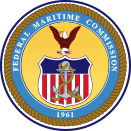Earlier this week I had an excellent discussion with the senior leadership of the International Longshore and Warehouse Union (ILWU) concerning the impact of the current pandemic on the financial wellbeing of their members.
International President William Adams, Vice-President Robert “Bobby” Olvera, Jr., and Committeemen Frank Ponce de Leon and Cameron Williams all participated, and we spoke on a variety of topics.
One theme that resonated throughout our conversation was the significantly negative impact this current pandemic has had on the financial welfare of ILWU members and the ports at which they ply their trades. Our discussion concluded with these leaders requesting that I travel to the ports in Alaska and Washington state to meet with their members and assess the situation firsthand. I assured them that I would make it a top priority to do so.
As my Fact Finding 30 investigation continues to study the effect of the standing “No Sail Order” issued by the Centers for Disease Control and Prevention, it is often easy to focus on the fiscal wellbeing of the cruise lines and the desire of the sailing public to be made whole when embarkations are cancelled. What we must not forget are the thousands of American laborers whose livelihood is directly related to the maritime industry; labor that is not only directly employed by the lines, but the many stevedores, tenders, and other port workers who are essential to the cruise ships’ ability to operate. In many ports, it is the cruise industry that comprises the bulk of the business and their failure to sail has a direct bearing on the income and benefits of folks who call those harbor communities home. While this is especially true with many of the small ports in the Pacific Northwest, there are similarly situated ports in my home state of Florida as well as other coastal states. The men and women who perform these sometimes difficult and thankless jobs are our friends and neighbors and our brothers and sisters, and we should never lose sight of the current difficulties they face or the contributions they make to our continued prosperity.
I have always been impressed with the people who make our sea ports run, and I will do what I can to draw attention to the difficulties this pandemic has wrought and, where possible, offer solutions to not only provide short-term relief during this current crisis but to also prepare us for the next challenge.

